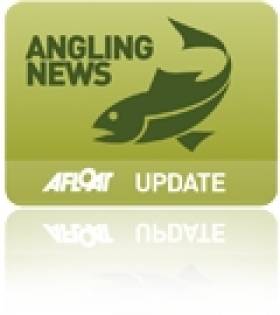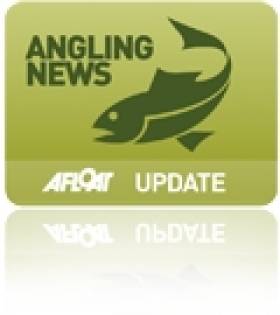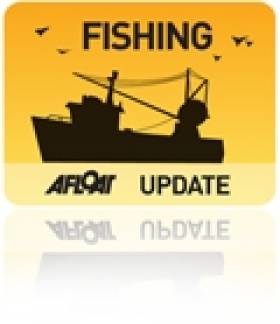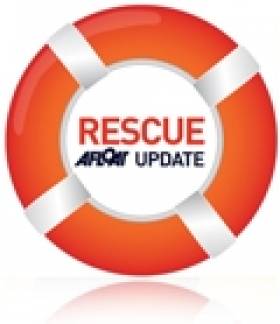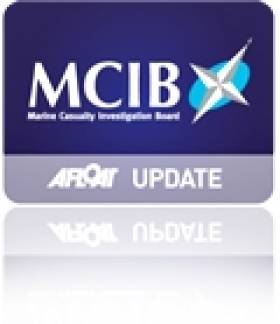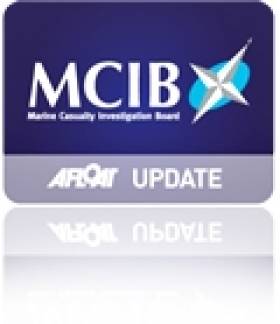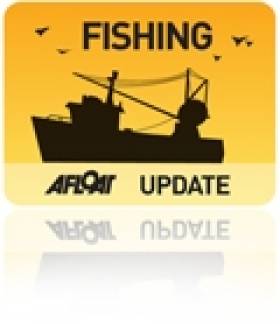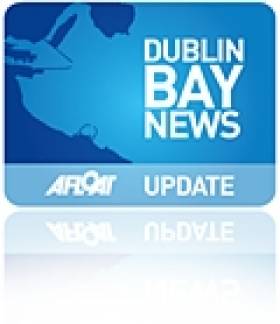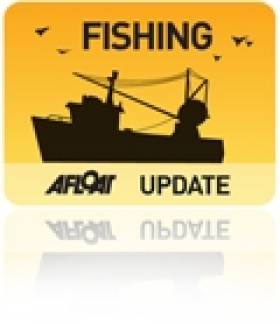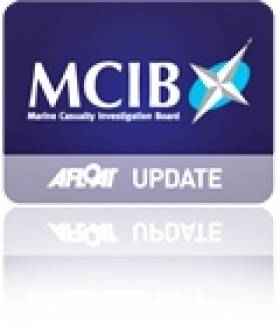Displaying items by tag: Fishing
Freeze on NI Fishing Licence Fees
Northern Ireland's sports minister has announced that there will be no increase in fishing licence fees for the 2012 angling seasons.
Carál Ní Chuilín said that "In light of the current economic climate, I have decided to keep the salmon and inland fishing licence fees at 2011 levels."
It marks the third year in a row that there has been no annual increase in fees for fishing licences.
The Minister added: "I hope this will continue to ease the financial burden on those involved in the commercial fishing sectors and encourage others to enjoy recreational fishing.”
The only changes for next year will be on fishing permits for the Public Angling Estate, which are subject to an inflationary rise of 4.8%.
The NI Department of Culture, Arts and Leisure says it is encouraging all fishermen and women to ensure that they have a rod licence and the correct permit to fish.
Those caught without the necessary documents will be reported with a view to prosecution, it says.
Fishing licences and permits are available to purchase online at www.nidirect.gov.uk/angling
New Fisheries Partnership for the River Shannon
The new group will comprise representatives from both bodies as well as Inland Fisheries Ireland, and will be independently chaired by former Shannon Fisheries Board CEO Eamon Cusack.
The plan is for anglers, fishery authorities and stakeholders to come together to assist in the management of the River Shannon.
At the group's launch in Athlone recently, Cusack said the partnership was working toward ensuring a sustainable yield of fish.
Crew Rescued from Sinking Fishing Boat off Donegal
The Irish registered 'Amy Jane' fishing vessel began taking in water about 13 miles off Malin Head this morning and was evacuated at 0945. The crew took to liferafts before being rescued. More details as we have it.
More from HM Coastguard
At 09.45am, Belfast Coastguard received a mayday call from a fishing vessel reporting that they were taking water and sinking.
The six crew of the fishing vessel took to their liferaft, dressed in their survival suits and took with them their EPIRB (Emergency Position Indicating Radio Beacon) which they had activated and a handheld VHF Radio.
Belfast Coastguard working with Malin Head Coastguard who had direct communications with the liferaft initiated a search and rescue mission to rescue the men.
The Irish Coastguard helicopter Rescue 118 based at Sligo was requested and was the Coastguard Helicopter Rescue 100 based at Stornoway.
The RNLI lifeboats from Portrush and Lough Swilly were also requested to launch.
The fishing Amy Jane SO876 registered in Sligo was 13 miles north of Malin Head when it made the mayday call.
The weather was reported as being North Westerly, Force 6 with a moderate swell.
Coleraine Coastguard rescue team are at City of Derry airport to receive the survivors.
Steve Carson, Watch Manager, Belfast Coastguard said:
We are pleased that this has been a successful rescue of six fishermen.
Sea Survival training which is undertaken by crew of fishing vessels and being properly equipped is a key factor in the rescue of these six men today.
Lost Irish Fishermen Found Safe and Sound Off Minehead
FOUR Irish fishermen reported missing on Sunday have been found in good spirits off the coast of Minehead in Somerset.
This Is The West Country reports that the four men had left Helvick harbour in Co Waterford early on Sunday on a fishing trip but got lost shortly thereafter.
After contacting the coastguard with their concerns, the Helvick Head RNLI lifeboat was dispatched to Minehead, where the lost boat had been found by another fishing vessel, Faoilean Ban.
The lost fishermen subseqently followed the Faoilean Ban back to port at Helvick.
MCIB Report on Sinking of Fishing Vessel 'Ainmire'
A breach in the engine compartment caused the fishing vessel Ainmire to take on water and sink off the coast of Scotland in April last year, according to the official report into the incident.
All crew on board the vessel were transferred safetly to another fishing boat that responded to its distress call, some 30 miles northwest of the Butt of Lewis on the morning of 29 April 2010.
The Marine Casualty Investigation Board (MCIB) report concluded that the failure of a sea water cooling pipe in the engine room was the most likely cause of the flooding, and pointed to the fact that the pipework had not been renewed during the life of the vessel.
It was also noted that the bilge pump and its motors were located under the floor plates in the engine room, and thus were inoperable when the water level had risen in the compartment.
In addition, the MCIB report found that the Ainmire has been operating without a Fishing Vessel Safety Certificate for more than six months at the time of the incident.
Though the owner had submitted a survey application and paid the required fee to the Marine Survey Office (MSO) the previous summer, a communication breakdown resulted in the required survey not being carried out before the expiration of the vessel's previous certification.
The MCIB advised boat owners and operators to be extra vigilant regarding the location of bilge pumps in their vessels.
It also warned that survey applications for certification "may not accommodate all situations", and that the issuing of a recepit is not a guarantee that an application is being dealt with.
The full report is available to download as a PDF from the MCIB website HERE.
MCIB Highlights Danger of Fishing Without Safety Gear
The Marine Casualty Investigation Board (MCIB) has called on the Government to continue highlighting the dangers of operating boats without adequate safety equipment, following its report into the death of a Wexford fisherman last year.
Michael O'Connor drowned after going overboard from his small open boat while fishing alone at Cullenstown, Co Wexford in the early hours of 7 September 2010.
The local Irish Coast Guard unit initiated a search when he did not return as expected later in the morning. His body was subsequently located next to his upturned boat around 9am.
It is not known to investigators how O'Connor came to be in the water when the incident occurred. He was found to be wearing a lifejacket, but no flares, VHF radio or other safety equipment were found on board his vessel.
The boat itself was also not a registered fishing vessel, and was unsuitable for carrying the fishing gear O'Connor had been using.
The report stated: "The combination of boat size, darkness, weather conditions, tidal flow, fishing equipment and the absence of safety equipment other than a lifejacket combined to increase the danger and reduce the chance of survival."
The full report is available to download as a PDF from the MCIB website HERE.
Low Cost Device Could 'Revolutionise' Commerical Fishing, Say Backers
A new, hi-tech global tracking device that could revolutionise the way the commercial fishing industry operates is to be officially launched following a series of successful trials across the South West of England.
Succorfish has worked closely with Seafish to design its newest and most advanced vessel monitoring system; the SC2. It has been developed specifically for the fishing industry and will allow vessels to accurately map and monitor their position using dual GPRS/GSM software to within one metre, provides closer access to marine protected areas such as Lyme Bay whilst avoiding hefty fines previously incurred when breached, and improve and increase overall inshore fishing activity.
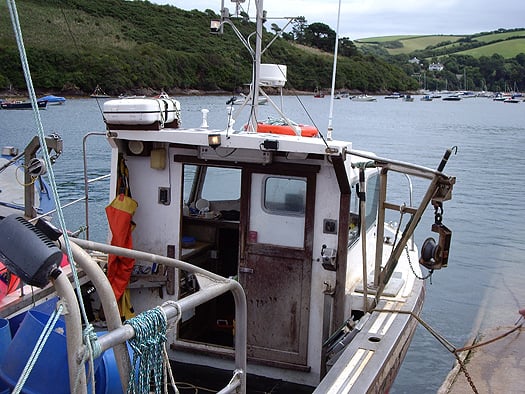
Succorfish's new hi-tech global vessel monitoring system, the SC2, can be seen to the right of the light on the wheel-house
The low cost device complies with current UK fishing laws and uses real time satellite and mobile phone technology, as well as online tracking software, to monitor and record the course and position of vessels via up-to-the-minute reporting. Information is then relayed back to a password protected website where users can view their personal data through a graphical user interface.
And, with new EU legislation being introduced in 2012 that will force all 12m-15m vessels to have monitoring systems with satellite reporting, the SC2 is now being regarded as the cost
effective solution to a worldwide fishing industry problem. Additionally, for vessels 15m and over, the product is also e-log ready and directly interfaces with a specialist, state-of-the-art catch reporting software system via a global satellite network.
Nick Prust, SWIFA Chairman and owner of one of the vessels that took part in the trials commented, “This is the solution that the industry has been looking for and the system will be
a real asset to fisherman regardless of their fishing methods. It will give us continued access to fishing grounds with spatial and temporal restrictions whilst allowing us to co-exist alongside
newly proposed MPA’s.”
George Henricks, Commercial Director of Succorfish added, “We have worked very closely with industry representatives and listened long and hard to all of the stakeholders who have
participated in the inshore VMS trial. All of those parties have a common goal in that they want to see the long-term security of both the marine environment and the livelihoods of the
fishermen. Therefore, by designing and developing a product like the SC2, we can directly support the industry and make huge strides towards achieving its goal.”
The SC2 has been developed in conjunction with Seafish and CEFAS following a 12 months pilot project to monitor the UK’s inshore fishing activity. It has been funded by Defra as part of
its remit to undertake economic and social research in the marine environment and overseen by representatives from the Marine Management Organisation (MMO), Natural England, Devon Sea Fisheries Committee, the South West Inshore Fishermen’s Association and the UK Marine Protected Areas Coalition Group.
Courtown Harbour Rowing Club took second place in a time of 3:3:19 and third place honours went to Stella Maris Rowing Club with a time of 3:16.00. The hosts of the Hobblers Challenge, St. Michaels Rowing Club based out of the Coal Harbour, passed under the high walls of the East Pier Lighthouse and battery some two minutes later in fourth place.
The annual event (for race-route click HERE) was only re-introduced onto the race calendar last year after a break of several years. The skiffs were launched at the Coal Harbour slipway where they headed over to line-up for the starter's gun opposite the Hobbler's Memorial located on the publicly accessible Eastern Breakwater which is between the Stena Line HSS fast-ferry berth and the Dun Laoghaire Marina.
In attendance to greet the start of the race in memorial of the Dublin Bay hobblers was the RNLB Anna Livia of the local RNLI lifeboat station. The bronze memorial depicts a tower of lifejackets in commemoration of three young Dun Laoghaire hobblers who after piloting and unloading the schooner Jealous of Me in Ringsend, failed to return home.
This occupation was carried out by men also from Ringsend, Dalkey and other harbours and it was the first crew to reach a ship and throw a hook on the deck who would win the business of pilotage and unloading in Dublin Port.
Crews would think nothing of rowing out to the Kish Bank on the hope of spotting a ship. If they waited offshore and no passing trade appeared along the East Coast the craft doubled as a bed if it became too late to row home. The craft were much larger and heavier compared to the present day skiff and it is in these oarstrokes that the Hobblers Challenge follows the original race of the hobblers during the 18th and 19th centuries.
It was apt that on the same day of this year's Hobblers Challenge, the 107-year-old ketch Bessie Ellen, a former cargo-carrying vessel that represented one of the last such sail-trading ships operating in the Irish Sea, was making a passage to the east of the Kish Bank.
To read more about the un-manned Kish Lighthouse click this HERE, and for the 150 cargo tons capacity ketch built in 1904 click HERE.
- Dublin Port
- Fishing
- Dun Laoghaire Marina
- Dublin Bay News
- Irish Lights
- Dun Laoghaire Harbour
- Kish Bank
- Ferry news
- Stella Maris Rowing Club
- Kish Lighthouse
- East Coast skiffs
- Dun Laoghaire Harbour and news
- Stena Line HSS Dun Laoghaire
- Hobblers Challenge
- Dublin Bay pilots
- Rowing news
- Coal Harbour Dun Laoghaire
- St. Michaels Rowing Club
- Courtown Rowing Club
- St.Patricks Rowing Club
- Ringsend skiff clubs
Fishing Vessel Detained in Cork
The Irish Times reports that the Naval Service detained a Spanish-registered fishing vessel off the Clare coast in the early hours of Tuesday morning.
The vessel was escorted by the LE Niamh to Castletownbere in Co Cork, where it was handed over to gardaí in relation to an alleged breaching of fishing regulations.
No other information is yet known but Afloat.ie will update as details arise.
Families Disagree with MCIB Report on F/V Jennifer
The Irish Examiner reports that the families of two fisherman who drowned off Malin Head last November disagree with the findings of the official investigation into the tragedy.
Eddie Doherty, 65, and his nephew Robert McLaughlin, 41, died after their small fishing boat F/V Jennifer capsized and sank off Glengad on 1 November last year.
The official report released last week by the Marine Casualty Investigation Board (MCIB) found that a combination of high winds in the area and unstable weight on the boat due to the crab pots it was carrying most likely caused the vessel to list to an angle from which it could not be recovered.
But Eddie Doherty's widow said she disagreed with this conclusion.
"With Eddie’s experience and his regard for safety the load would have been spread evenly over the deck of the boat and therefore this would not have had an adverse affect on the stability of the boat," said Marian Doherty.
The full MCIB report is available to read in full HERE.


























